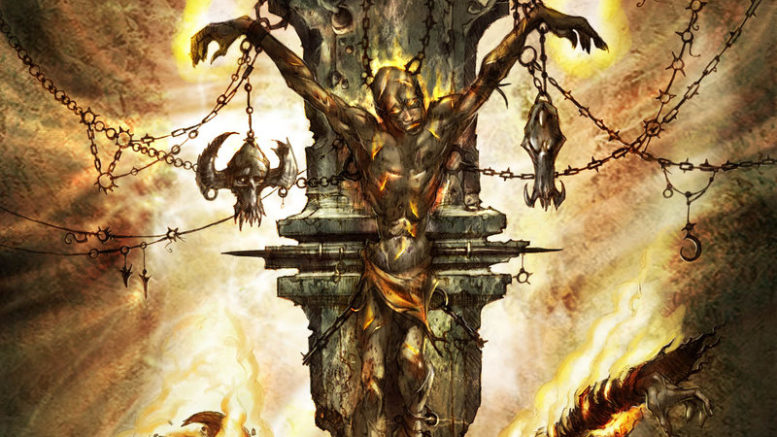You feel your body drop roughly into the mud as you awake. You see black leather boots and hear Bastia’s voice. You hear the crackling of a bonfire. You realize you are out in the Viskothic fort’s courtyard. You look up and see Seth running away into the shadows over by the commander’s quarters. He turns to look at you; you can see the struggle in his eyes. He turns away and disappears into the shadows. You see the elf Mirzam looking at you too. There is contempt in his eyes. He smiles and turns away, also disappearing into the shadows. Something deep within you screams out. You know you have been abandoned.
You hear Bastia’s boot slamming into you as you are flipped over. It takes a few seconds for the pain to register, and then it washes over you like acidic fire. You fall back into unconsciousness. When you awaken again, it is daylight, and you are being chained to a flatbed carriage by two church Templar, much like Seth was chained to so many months ago. They say nothing. Only the sounds of the clinking chains and the creaking wood can be heard. You look up and see the sky is clear and bright. The commander is there looking at you, his face as unreadable as stone. The inquisitor priests known as the Blackrobes are there too. One begins to read to you. Passages from the Book of Naqdimon. It is a liturgy.
The Templar mount up and you are drawn out of the fort down the road. Peasants pass buy, look at you and quickly turn away, crossing themselves. Days pass. Then weeks. The winds turn icy cold. You are carried down the King’s Highway back west through Viskoth. Stops are made along the way to several towns and villages where you are made an example of in the town square. People throw filth at you, cursing your name.
“Jonas the Apostate!”
“Jonas the heretic!”
“Jonas the damned!”
The weeks pass by. You travel through Caer Vallis, the fortified capitol of Viskoth. You are left in the town square to suffer the cold of November at night. Your fingers turn white, then black with frostbite. Then on to Caer Mirabar. Again the public sermons, the public humiliation. Occasionally there is pity in a few eyes, more often hatred.
A brief flicker of hope stirs through you as your caravan leaves Mirabar’s capital, for you see another passing caravan, and on a mail-clad horse is the king himself! King Vindicarius XII. He looks at you as you pass each other. You know you can see recognition in his eyes. He looks upset, or at least unsettled. Perhaps he will free you? But no, he too turns away, with never a word.
By the time you reach the outskirts of Waterdeep, it is well into winter. Some strange medicines of the Blackrobes are keeping you alive, for your hands and feet have long since died. You try not to look at them. They are blackened and swollen. It has been weeks since you had any feeling from your extremities, and despite the cold they are starting to stink, like fetid meat.
Your vision starts to fail soon after; the last sight you ever see with your mortal eyes is the skeletal spire of St. Lyonne’s Cathedral, a black spike stabbing towards an uncaring god.
Darkness of a dungeon cell. You hear rats. You can vaguely feel their gnawing at your dead limbs. A few times you are dragged before a triad of black robed judges, asked if you repent of your crimes. Even if you still had a voice you would probably say something that could only be interpreted as a no. Sometimes your belly is ripped open, sometimes your joints are cracked. You only laugh, you feel nothing anymore.
The day it happens, you instinctively know. You know there is no trial today. You are dragged out into the cold. Only the singing of birds alerts you to the fact that it is day, for even in the light all is darkness now. You are led somewhere and can feel ropes around you, holding you upright. You smell the pitch, and hear the snapping sounds of burning pinewood. For the first time in you don’t know how long you feel warmth, then you feel nothing.
The last voice you ever hear is that of the blackrobe Msgr. Bastia, “Now is your final chance Jonas! What shall it be?”
Your vision clears. You see that you are at some sort of crossroads in the middle of a quiet countryside full of wheat-fields. The day is clear and bright. At this crossroads stand two figures.
One is a tall blond man wearing white robes and carrying a large bastard sword. He is wreathed in golden light, so bright that it takes a few seconds before your eyes adjust and you can see the large feathery wings that sprout from his back, flapping ever so slowly. He holds his hand out towards you. “Come Jonas, it is not yet too late.” Even now He offers you salvation.
Another voice. The cloaked figure with the burning eyes of silver, the one from your visions. He stands there now on the other path, the one towards your left, strangely out of place in this scene. Even in the bright light of day he seems cloaked in shadow. He raises his hand and clenches it into a fist, saying, “I offer you vengeance!”

Be the first to comment on "How the Gods Kill… Jonas’s Moment of Truth"